#the guermantes way
Text
Real beauty is so individual, so unfamiliar at first sight, that it is not recognized as beauty.
from In Search of Lost Time, Book 3: The Guermantes Way by Marcel Proust
#in search of lost time#the guermantes way#marcel proust#proust#real beauty#beauty#individual#first sight#unfamiliar#recognize#recognition
41 notes
·
View notes
Photo
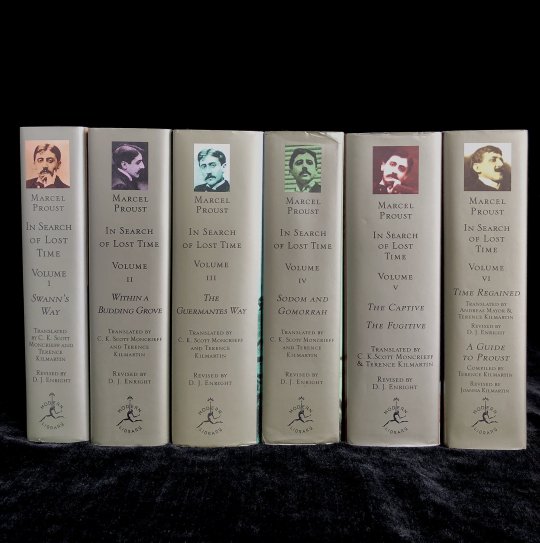

Marcel Proust “In Search of Lost Time".
1. Swann's Way (1913)
2. Within a Budding Grove (1919)
3. The Guermantes Way (1920–1921)
4. Sodom and Gomorrah (1921–1922)
5. The Captive (1923)
6. The Fugitive (1925)
7. Time Regained (1927)
#book#proust#marcel proust#in search of lost time#swann's way#within a budding grove#the guermantes way#sodom and gomorrah#the captive#the fugitive#time regained#recommend
83 notes
·
View notes
Text
normies: telephone operators
proust: Danaids of the unseen, umbrageous priestesses of the Invisible, ever-irritable handmaidens of the Mystery, Daughters of the Night, Messengers of the Word, capricious Guardians of the miraculous portal
60 notes
·
View notes
Text
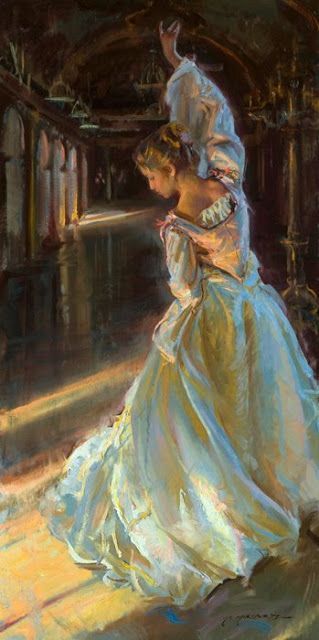
Daniel Gerhartz "In Her Dreams"
#the guermantes way#marcel proust#the captive#the search of lost time#daniel gerhartz#art#literature
2 notes
·
View notes
Text
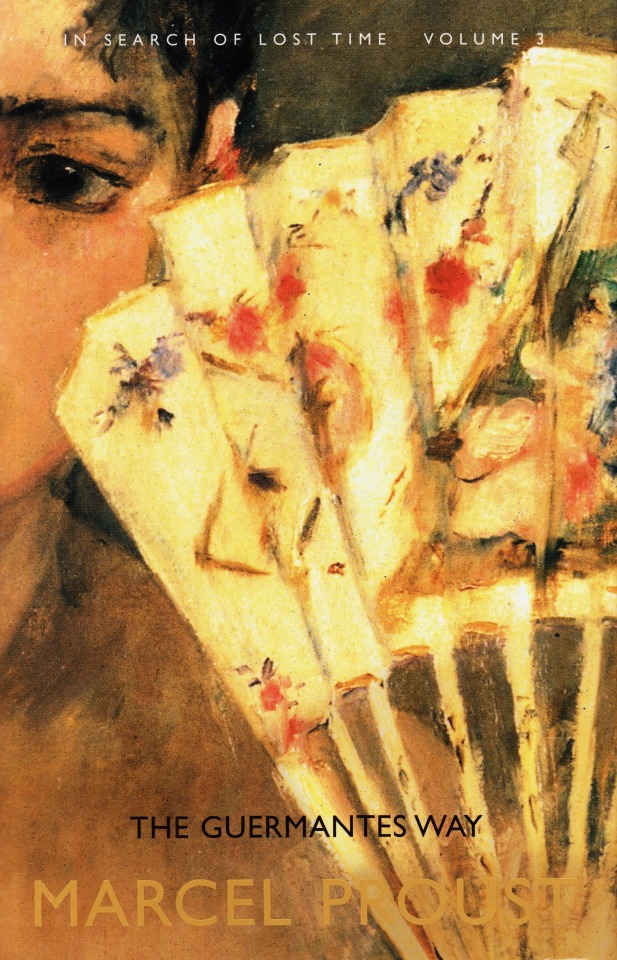
The Guermantes Way (1920-1)
Marcel Proust
Allen Lane
0 notes
Text
The longest dinner party in literature... #proust #theguermantesway
At the end of August, I featured several large piles of Big Books which I was hoping to spend a little time with in the coming weeks. The observant amongst you might have noticed that lurking at the bottom of one of the piles was the second volume in my four volume set of Proust’s “In Search of Lost Time”; this contains part of “Within a Budding Grove” (which I read ages ago) and “The Guermantes…
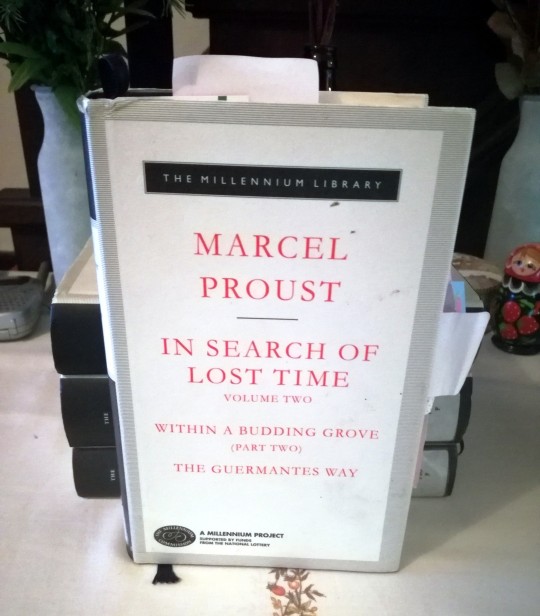
View On WordPress
0 notes
Text
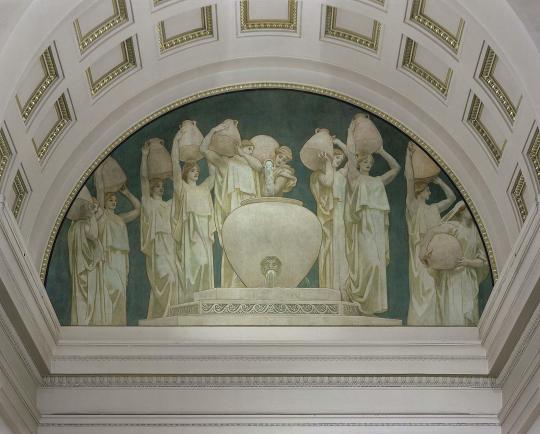
john singer sargent, mural of the danaïdes, located over the library door of the mfa boston, 1925
For many commentators this [the Danaïdes' punishment, eternally bringing water to fill a sieve] became an image of the unhappiness related to something that can never be achieved. But Bachofen sees the forty-eight girls differently […] As Bachofen saw it, that constant pouring of water into a bottomless container had nothing futile or despairing about it. On the contrary, it was almost an image of happiness. He recalled another mythical girl: Iphimedeia. She had fallen in love with Poseidon, as had Io with Zeus. So she would often walk along the beach, go down into the sea, raise the water from the waves and pour it over her breasts. A gesture of love. Then one day Poseidon appeared, wrapped himself around her, and generated two children. Iphimedeia’s gesture has something blissful and timeless about it; it is the motion of feminine substance toward the other, toward any other. A motion that cannot be satisfied, satisfied only in its unfailing repetition.
roberto calasso, the marriage of cadmus and harmony, trans. tim parks, 1993
#texts#john singer sargent#sorry I hate the shit in the calasso quote about the ''motion of feminine substance'' but love the last sentence re:#location of mural over the library door#almost put the entire danaids of the unseen passage from guermantes way in this post too but didn't want to make#everyone's dash totally unusable so just imagine it's there too
29 notes
·
View notes
Note
Inspired by your last ask! What are the best French books you’ve read that have no English translation yet? I read Play Boy and Qui a tué mon père (really loved the latter) last year and it feels so fun to read something that other Americans can’t access yet
I'm too nervous to make any list of the Best XYZ Books because I don't want to raise your expectations too high! But okay, here's my No English Translation-themed list of books I've enjoyed in recent years. I tried to make it eclectic in terms of genre as I don't know what you prefer :)
Biographies
• Le dernier inventeur, Héloïse Guay de Bellissen: I just love prehistory and unusual narrators so I enjoyed this one; it's about the kids who discovered the cave of Lascaux, and some of the narration is written from the perspective of the cave <3 I posted a little excerpt here (in English).
• Ces femmes du Grand Siècle, Juliette Benzoni: Just a fun collection of portraits of notable noblewomen during the reign of Louis XIV, I really liked it. For people who like the 17th century. I think it was Emil Cioran who said his favourite historical periods were the Stone Age and the 17th century but tragically the age of salons led to the Reign of Terror and Prehistory led to History.
• La Comtesse Greffulhe, Laure Hillerin: I've mentioned this one before, it's about the fascinating Belle Époque French socialite who was (among other things) the inspiration for Proust's Duchess of Guermantes. I initially picked it up because I will read anything that's even vaguely about Proust but it was also a nice aperçu of the Belle Époque which I didn't know much about.
• Nous les filles, Marie Rouanet: I've also recommended this one before but it's such a sweet little viennoiserie of a book. The author talks about her 1950s childhood in a town in the South of France in the most detailed, colourful, earnest way—she mentions everything, describes all the daft little games children invent like she wants ageless aliens to grasp the concept of human childhood, it's great.
I'll add Trésors d'enfance by Christian SIgnol and La Maison by Madeleine Chapsal which are slightly less great but also sweet short nostalgic books about childhood that I enjoyed.
Fantasy
• Mers mortes, Aurélie Wellenstein: I read this one last year and I found the characters a bit underwhelming / underexplored but I always enjoy SFF books that do interesting things with oceans (like Solaris with its sentient ocean-planet), so I liked the atmosphere here, with the characters trying to navigate a ghost ship in ghost seas...
• Janua Vera, Jean-Philippe Jaworski: Not much to say about it other than they're short stories set in a mediaeval fantasy world and no part of this description is usually my cup of tea, but I really enjoyed this read!
Essays / literary criticism / philosophy
• Eloge du temps perdu, Frank Lanot: I thought this was going to be about idleness, as the title suggests, and I love books about idleness. But it's actually a collection of short essays about (French) literature and some of them made me appreciate new things about authors and books I thought I knew by heart, so I enjoyed it
• Le Pont flottant des rêves, Corinne Atlan: Poetic musings about translation <3 that's all
• Sisyphe est une femme, Geneviève Brisac: Reflections about the works of female writers (Natalia Ginzburg, Virginia Woolf, Sylvia Townsend Warner, etc) that systematically made me want to go read the author in question, even when I'd already read & disliked said author. That's how you know it's good literary criticism
Let's add L'Esprit de solitude by Jacqueline Kelen which as the title suggests, ponders the notion of solitude, and Le Roman du monde by Henri Peña-Ruiz which was so lovely to read in terms of literary style I don't even care what it was about (it's philosophy of foundational myths & stories) (probably difficult to read if you're not fully fluent in French though)
Did not fit in the above categories:
• Entre deux mondes by Olivier Norek—it's been translated in half a dozen languages, I was surprised to find no English translation! It's a crime novel and a pretty bleak read on account of the setting (the Calais migrant camp) but I'd recommend it
• Saga, Tonino Benacquista: Also seems to have been translated in a whole bunch of languages but not English? :( I read it ages ago but I remember it as a really fun read. It's a group of loser screenwriters who get hired to write a TV series, their budget is 15 francs and a stale croissant and it's going to air at 4am so they can do whatever they want seeing as no one will watch it. So they start writing this intentionally ridiculous unhinged show, and of course it acquires Devoted Fans
Books that I didn't think existed in English translation but they do! but you can still read them in French if you want
• Scrabble: A Chadian Childhood, Michaël Ferrier: What it says on the tin! It's a short and well-written account of the author's childhood in Chad just before the civil war. I read it a few days ago and it was a good read, but then again I just love bittersweet stories of childhood
• On the Line, Joseph Ponthus: A short diary-like account of the author's assembly line work in a fish factory. I liked the contrast between the robotic aspect of the job and the poetic nature of the text; how the author used free verse / repetition / scansion to give a very immediate sense of the monotony and rhythm of his work (I don't know if it's good in English)
• The End of Eddy, Edouard Louis: The memoir of a gay man growing up in a poor industrial town in Northern France—pretty brutal but really good
• And There Was Light, Jacques Lusseyran: Yet another memoir sorry, I love people's lives! Jacques Lusseyran lost his sight as a child, and was in the Resistance during WWII despite being blind. It's a great story, both for the historical aspects and for the descriptions of how the author experiences his blindness
• The Adversary: A True Story of Monstrous Deception, Emmanuel Carrère: an account of the Jean-Claude Romand case—a French man who murdered his whole family to avoid being discovered as a fraud, after spending his entire adult life pretending to be a doctor working at the WHO and fooling everyone he knew. Just morbidly fascinating, if you like true crime stuff
#ask#book recs#the book i started reading last night is The Naked Neanderthal by Ludovic Slimak and i also didn't#expect it to have an english translation but it does#i'm only at the beginning and so far it's philosophical ponderings about what kind of creature the neanderthals were#if they were humans in a different way than us. with a different kind of intelligence#and how to understand it without projecting our own way of being in the world onto this other humanity#sorry to quote cioran again but it reminds me of when he said every generation misses the good old days and#if we retrace our steps from regret to regret we'll find the original regret#our nostalgia for a time when humans weren't yet human
203 notes
·
View notes
Text
Please let me finish. It is just because I am unmoved by a certain type of humour, that I am often struck by my wife’s wit. For you will find it based, as a rule, upon sound observation. She reasons like a man; she states her case like a writer.
— Marcel Proust, The Guermantes Way
50 notes
·
View notes
Quote
Everything we think of as great has come to us from neurotics. It is they and they alone who founded religions and create great works of art. The world will never realise how much it owes to them, and what they have suffered in order to bestow their gifts on it. We enjoy fine music, beautiful pictures, a thousand exquisite things, but we do not know what they cost those who wrought them in insomnia, tears, spasmodic laughter, urticaria, asthma, epilepsy, a terror of death which is worse than any of these, and which you perhaps have experienced, Madame.
Marcel Proust, The Guermantes Way
454 notes
·
View notes
Text

The Guermantes Way
8 notes
·
View notes
Text
Losing one's way is nothing; the problem is finding it again.
from In Search of Lost Time, Book 3: The Guermantes Way by Marcel Proust
#in search of lost time#the guermantes way#marcel proust#proust#losing ones way#losing your way#losing the way#its nothing#the problem#the problem is#find it again#finding it again#time regained#finding time again#time found#find time#finding time#time again
22 notes
·
View notes
Text
“It is in sickness that we are compelled to recognise that we do not live alone but are chained to a being from a different realm, from whom we are worlds apart, who has no knowledge of us and by whom it is impossible to make ourselves understood: our body.
…To ask pity of our body is like discoursing in front of an octopus, for which our words can have no more meaning than the sound of the tides, and with which we should be appalled to find ourselves condemned to live.”
The Guermantes Way, Marcel Proust
trans. Moncrieff and Kilmartin, revised by D.J. Enright
19 notes
·
View notes
Text
What one has meant to do during the day, as it turns out, sleep intervening, one accomplishes only in one’s dreams, that is to say after it has been distorted by sleep into following another line than one would have chosen when awake. The same story branches off and has a different ending.
Marcel Proust - 'The Guermantes Way'
2 notes
·
View notes
Text
“Love is not vain because it is frustrated, but because it is fulfilled. The people we love turn to ashes when we posses them.”
Marcel Proust
Remembrance of Things Past: Volume II - The Guermantes Way & Cities of the Plain
3 notes
·
View notes
Photo

Jeremy Irons and Ornella Muti in Swann in Love (Volker Schlöndorff, 1984)
Cast: Jeremy Irons, Ornalla Muti, Alain Delon, Fanny Ardant, Marie-Christine Barrault, Anne Bennent. Screenplay: Peter Brook, Jean-Claude Carrière, Marie-Hélène Estienne, Voilker Schlöndorff, based on a novel by Marcel Proust. Cinematography: Sven Nykvist. Production design: Jacques Saulnier. Film editing: Françoise Bonnot. Music: David Graham, Hans Werner Henze, Gerd Kuhr, Marcel Wengler.
I certainly don't think that Proust's In Search of Lost Time couldn't, or shouldn't, be adapted to another medium: A well-produced miniseries might well do the trick. But for all the talent involved in this adaptation of the "Swann in Love" section of Swann's Way, the return on investment is slight: an opulent trifle, a pretty picture of the Belle Époque. The most significant contributions to the film are made by its production designer, Jacques Saulnier, and its cinematographer, Sven Nykvist, who keep the eye ravished even while the mind feels hunger pangs. There are some remarkable performances that make you feel that at least Proust has been read, including Fanny Ardant's Duchesse de Guermantes, Marie-Christine Barrault's wonderfully alive and vulgar Mme. Verdurin, and especially Alain Delon's Baron de Charlus. Yes, Proust's Charlus is fat where Delon is lean, but Delon's dissipated beauty -- he's like the picture of Dorian Gray when it had just begun to reflect its subject's debauchery -- and his sly appreciation of the Guermantes footmen give us something of the essential Charlus. I have a sense that Swann should be a good deal less handsome than Jeremy Irons and that Odette was not quite as sex-kittenish as Ornella Muti, but they move through their roles well even if their voices have been dubbed by French actors. (The dubbing is most noticeable in Irons's case, since his purring lisp has become so familiar over the years.) The screenplay plucks scenes from here and there in the Search, not confined to the titular section, but fails to put it all together in a satisfying whole. If ever a case could be made for a voice-over narrator, reflecting Proust's own Narrator, I would think it would be here.
2 notes
·
View notes